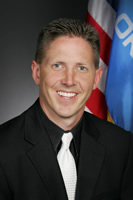In order to provide equal access and equal opportunity to people with diverse abilities, this site has been designed with accessibility in mind. Click here to view
New law will help get struggling Oklahomans back on the road
 Sen. Josh Brecheen
Sen. Josh Brecheen
One of the main roadblocks faced by Oklahomans recently released from prison who are trying to reintegrate into society is a lack of finances to afford driver license reinstatement fees. The costs associated with reinstating a suspended driver license can range anywhere from $300 to $700, and for those already struggling to pay off court fines still owed after incarceration, such a sum can be in surmountable. In an effort to help these individuals, Sen. Josh Brecheen authored Senate Bill 97 this year authorizing the Department of Public Safety to issue provisional driver licenses allowing individuals whose licenses have been suspended or revoked to drive to certain locations including their place of employment.
“These individuals have paid their debt to society and we should not punish them further by not allowing them to be able to drive. They can’t become self-sufficient, productive members of society until we give them access to the tools they need to succeed and the most important is being able to drive to work, attending treatment, and taking care of their children,” said Brecheen, R-Coalgate. “I want to thank Senator Johnson, Representative Nelson, my colleagues in the legislature and Governor Fallin for their support of this important piece of legislation.”
The bill would allow such individuals to drive between their place of residence and their place of employment as well as any college or technology center they may be attending, any court-ordered treatment program they are required to attend, their child’s school or day care provider and any place of worship.
Sen. Constance N. Johnson, coauthor of the Senate bill, said having a provisional license will help empower those who are trying to start a new life.
“As coauthor, I’m excited about what this legislation will mean to those Oklahomans for whom a lack of transportation has affected their ability to work and to return to society as a contributing member. I have many constituents who get pulled over regularly on their way to work for driving without a license,” said Johnson, D-Oklahoma County. “This measure offers a ray of hope to those citizens who just want to do the right thing but have faced transportation challenges.”
Anyone issued a provisional license will be required to pay $25 per month toward the satisfaction of all outstanding driver license reinstatement fees.
This is the third year Brecheen has brought this measure before the legislature but was never able to get it out of the House until this year. He attributes the bill’s passage in the House to the hard work of the bill’s House principal author Rep. Jason Nelson and co-author Rep. Pam Peterson.
“I’m pleased that we can provide a well thought out, affordable pathway for those who want to change past behavior and do so while still ensuring public safety is preserved,” said Nelson, R-Oklahoma City. “In this bill, we ensured that those whose license was suspended for drunk driving or vehicular homicide won’t be eligible for the program. The Department of Safety will also develop further rules of eligibility to make sure only those struggling financially have access to the program.”
Peterson worked diligently to ensure the bill also allowed participants to drive to court ordered treatment programs.
“Women in Recovery out of Tulsa is a perfect example of a program that will benefit from this legislation,” said Peterson, R-Tulsa. “Like other integration programs, it seeks to find permanent work placement for those they assist. Currently, 45 percent of those who they secure employment for can’t meet job requirements due to a lack of reliable transportation as a result of not having a driver license. They simply can’t afford the one time reinstatement fee. This change will greatly enhance that program’s ability, and others, to help people become contributing members of society once again.”
SB 97, which was signed Tuesday by the governor, will go into effect November 1, 2013.
 Oklahoma Senate
Oklahoma Senate

